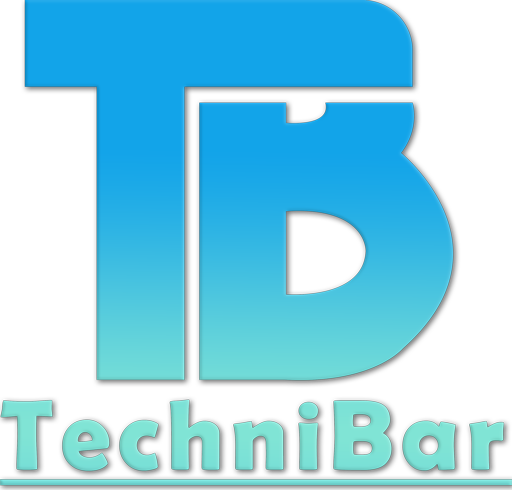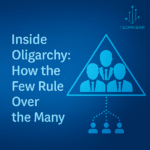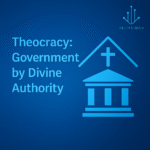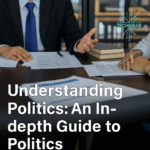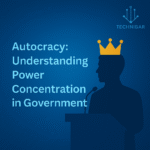One of the most powerful and disputed concepts in human history is the word democracy that suggests the images of freedom, the right of participation, and the voice of people. It has become an icon of political hope to many countries and more than a system of governance but a hope of a people in which authority is held by the people. However, not being ideal in any way, democracy has its shortcomings. Democracies are now under pressure of authoritarianism, misinformation, inequality, and lack of trust, all around the world.
What Is Democracy?
In its simplistic form, democracy refers to a form of government, where political authority resides within the hands of the people. It derives its name in Greek as “demos (people)” and “kratos (power or rule)” and as such represents rule by the people literally. Citizens are accorded a right to participate in political choices of the state normally performed by voting and elective participation.
In the case of modern democracies, they can be divided into:
Direct Democracy:
The people decide on policies and laws through the ballot box. The system is uncommon in big societies but observed in referendums and small politics.
Representative Democracy:
The electorate chooses representatives to act on their behalf and make decisions on behalf of people. It is the most widespread one in contemporary nation-states. The other varieties and mixture types are liberal democracy (with focus on the rights of individuals and the rule of law), parliamentary democracy and presidential democracy.
Historical Maturation of the Democracy
Democracy is an old concept that has considerably changed over the years.
Ancient Beginnings
It was in Greece, 5 th century before Christ that the earliest known democracy was witnessed in Athens. The people directly took part in making decisions publicly (citizens not including women, slaves and foreigners). Although the model was narrow in scope and numbers, it contributed to the later democratic thinking.
Enlightenment Influence
Enlightenment philosophers John Locke, Jean-Jacques Rousseau, and Montesquieu, advocated popular sovereignty, the social contract, and a separation of powers in the 17 th and 18 th centuries. Their thoughts led to revolutions and a formation of democratic republics.
20th Century Growth
The 20 th century was marked by a spectacular spread of democracy:
- There were new democratic countries that appeared after World War I and World War II.
- African and Asians faced the process of decolonization thus creating democratic regimes in most of the new independent states.
- The Cold War has divided the globe, however, with the fall of the Berlin wall in 1989 and the dissolution of the Soviet Union, there rose the movement toward democracy in Eastern Europe as well as elsewhere.
Axioms of Democracy
Although there are plenty of variations about, however, all the systems of democracy have some underlying principles:
Popular Sovereignty
It lastly depends upon the people who have power. In democracies, power is given to the government by the people who govern them.
Free and Fair Elections
Transparent periodic elections contradict with the idea of choosing their rulers and holding them responsible. Universal suffrage has seen that everyone is allowed to vote at an adult age and this is based on race, gender and asset ownership.
Rule of Law
Democracy also practices the rule of the law whereby all laws are applicable and acted upon equally by citizens and the government is not unquestionable as regards the law.
Rights and Freedoms Protection
Democracies protect civil freedoms such as freedom of speech, religion, press as well as housing. On participation and dissent, these rights become necessary.
Checks and Balances
To avoid the misuse of power, the democratic systems tend to separate the power of the government into different branches: the executive, the legislative and the judicial.
Pluralism and Tolerance
A healthy democracy is the one which tolerates diversity of thought, religion, ethnicity and political opinion. It promotes discussion and non violence.
Democracy Strengths
Democracy has many advantages which have made it popular all over the globe:
Accountability and legitimacy
People give legitimacy to the democratic governments. There is a threat of tyranny because leaders are subject to elections.
Human Rights Protection
Democracies have greater levels of protection of human rights because the power is decentralized and constrained under the rule of law and their control to the general populace.
Promotion of Creativity and Development
Freedom of exchange of ideas fosters creativity, innovation in science and economic growth.
Conflict Resolution
Democratic processes such as debate, negotiations as well as judicial procedures present peaceful means through which conflicts in societies can be solved.
Democracy Criticisms and Arguments against Democracy
Albeit the advantages, democracy does have weaknesses. The issue of democracy in most of the areas is challenged:
Low Turnout and Voter Apathy
Disengagement and declining voter turnout swims across many democracies. Democracy becomes ineffective when citizens have the sense that their votes are not important.
Corruption and Elitism
There is the tendency of interest groups, corporate culture and politicians in the business of corruption to undermine democratic principles and distort policies to serve the interests of elites.
Disinformation and Polarization
Political polarization and misinformation due to an increase in the use of social media and partisan media have endangered the ability of people to make decisions that are informed.
Institutional Decline Erosion
Examples of democracies where the leadership has tampered with the law, assaulted the judiciary, or discredited the press to gain supremacy have crossed the boundary between the phenomenon of democracy and authoritarianism.
Short-Termism
This may not be about the long term planning as the elected leaders aim at getting the subsequent election. It may lead to a lack of effective continuity of the policies and avoided concerns such as climate change.
Democracy of Crisis: International Trends
The dissimilarity in the last quarter-century has been the so-called democratic recession, according to some of the researchers.
- The nonprofit organization that tracks political freedom, the Freedom House, has stated that the level of democracy is worsening all over the world over 15 consecutive years.
- Democratic backsliding has also been witnessed in countries such as Hungary which has led to suppression of dissent, control of media and hindrances of independent institutions in India, Turkey and Brazil.
- There is increasing authoritarian populism, which tends to become electorally successful through cultivating nationalism, fear or economic discontent.
- Even mature democracies such as the United States and the United Kingdom have experienced extreme democratic strain, in e.g., lies in the electoral process, inability to pass legislation, and loss of popular confidence in the institutions.
The Use of Technology in Democracy
The use of technology in regard to democracy is a mixed blessing:
The Good
- The experience in the process of digital participation increases with ease of organizing, advocacy and access to information.
- Civic applications, online voting and e-petitions can transform the system of governance into the new one, which is more efficient and transparent.
The Bad
- Opinions and fake news could be polarized and be circulated with the help of social media algorithms.
- The technologies of surveillance threaten to violate the right to privacy and civil liberties.
- Democracy is endangered by cyberattacks and election interference.
- Finding the balance between improved technological advancements and democratic accountability is one of THE questions of our age.
Enhancing Democracy: What One Can Do?
As much as there are areas in the world that experience a decline in democracy, the situation is not so hopeless that there is no way to salvage it. A number of activities can bring back democratic processes:
Civic Education
Empowered participation and resistance to disinformation through education of citizens about their rights, responsibilities, and knowledge of democracy can be achieved by answering questions related to all of the above.
Electoral Reform
Less polarization and fair elections might be supported by the enhancement of the democratic processes (i.e. through ranked-choice voting, transparency of campaign financing).
Institution Building
Strong civil society, an independent judiciary and a free press serve as the depressors to government excesses.
Inclusive Governance
Ensuring that the minorities, youth, women, and the marginalized individuals find a voice is the key to having a representative democracy.
Global Solidarity
Pro-democracy movements can be supported by international organizations and democratic countries, warn them about the violation, and give the best practices.
How to Make Democracy Work tomorrow?
Democracy needs to adapt, renew and respond to the emerging challenges to prevail in the future. It is also expected that democracy would strongly be challenged in a multipolar world by authoritarian capitalism (e.g., China) and illiberal populism.
Is democracy too weak to address global issues such as a pandemic or one on climate change in comparison to centralized regimes?
- Will the use of technology increase or decrease democratic standards?
- Will the citizens be able to reunite power in the systems where elites have become the majority?
- Institutions will be only one part of the answers, and the contingency will not lie in their functioning, but in the will of people to be involved, to be informed, to demand accountability of leaders, and to have the faith in the promise of democracy.
Conclusion
Democracy is not only a form of government, it is also a living concept, it is a dedication to equality, Liberty and Human Dignity. Ugly, sluggish and very flawed, it is, nevertheless, one of the most potent instruments of creating just and inclusive societies. The challenges that the 21st century is facing are becoming too difficult to tackle and because of that, a good and responsive democracy is much needed.
It will live or die depending on how well we preserve it and make it perfect. As Abraham Lincoln says, it is indeed the government of the people, by the people and yet for the people so long as the people are willing to support democracy.
FAQS
1. What does democracy essentially mean?
Answer: In democracy, people are the custodians of political power. People play directly or indirectly in the citizenry’s noble exercise of making a decision. Free and fair polls, rights and freedoms protections, the rule of law and accountability to governance are some of the key aspects of democracy.
2. What are forms of democracy?
Answer: The principal forms of democracy are:
- Direct Democracy: The citizens are able to vote on regulations and policies.
- Representative Democracy: In this, the leaders are elected by the citizens who are to act on behalf of the citizens.
- Liberal Democracy: It focuses on basic rights of individuals, due process of the law, and a distinct separation of powers.
- Participatory Democracy: Leads to active participation of citizens other than in voting.
These forms form hybrids of many contemporary governments.
3. What type of concepts of a democratic government are there larger?
Answer: Principles The principal tenets of democracy are:
- popular sovereignty (populousness own sovereign power)
- Free and regular elections
- Rule of law
- Separation of powers
- Human rights protection
- Freedom of media and speech
- Tolerance and political pluralism
It is because of these principles that democracy is left accountable, inclusive and fair.
4. What are the greatest challenges of democracies nowadays?
Answer: The challenges that democracy encounter include:
- Polarization of politics and social division
- The reduction of confidence in the media and institutions
- Elite capture and corruption
- Voter interference and false information
- Curb of free press
- Indifference and lack of part-takings by voters
To solve such problems, institutional change, citizen education and citizen action are necessary.
5. Is United States is the united states a democracy or a republic
Answer: The United States is a democratic republic, meaning it is a republic where leaders are elected through a democratic process.
Citizens vote to choose representatives who govern according to a written Constitution and the rule of law.
